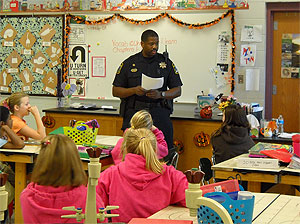Not everyone shares the same perspective on every issue concerning politics, policies, social matters, or worldviews. Rather than attempting to stifle political discourse, we should encourage and empower voters to make their own informed decisions. We must have faith in the voters to make educated choices that will help shape a brighter future for our state and nation.
Economic concerns and who you trust to handle the economy are cited as the most significant factors influencing voter sentiment for the 2024 presidential election. Education is a crucial driver of economic growth and prosperity, but that has been lost in the discussion.
Extensive research shows that investing more in education fosters economic development, resulting in higher individual salaries, improved workforce efficiency, and an increased gross domestic product. Evolving party dynamics and changing priorities will shape the electoral landscape. Additionally, crime and health care remain significant issues.
Public education is most effective when accountable to the local community rather than a distant bureaucracy in state capitals or Washington, DC. Since 1965, federal one-size-fits-all mandates have burdened local educators. We need leaders dedicated to educating our children and transforming them into moral, productive, and literate citizens.
One viewpoint criticizes the government and advocates for dismantling public education. Proponents of this perspective argue for a privately managed system that they believe will be more effective. Regardless of individual opinions, polished marketing messages emphasizing opportunity, innovation, and efficiency can be expected. Ultimately, the goal is to eliminate public education, which they perceive as detrimental.
Conversely, another perspective highlights that non-academic skills can significantly impact life outcomes, sometimes even more than academic skills. This does not diminish the essential role of literacy and numeracy education, nor does it lessen the importance of history and science courses; both are critical for informed citizenship and workforce success. However, it’s crucial to recognize that success in various life domains is not solely dictated by a few points on state assessments, which often lack true predictive power.
Under both perspectives, it is imperative that parents and community members have a strong vested interest in the success of the schools, and they must co-own the outcomes that are produced. Parents have the right to know how well their children perform compared to their peers nationwide. In addition, taxpayers who support our public school system have the right to know that any system they fund produces the promised results.
The education reform movement urgently needs reform. It has become disconnected from teachers and no longer prioritizes students. Many reforms lack solid evidence. We must consider teachers’ insights on their development to improve student performance. Raising test scores doesn’t guarantee lifelong success, especially if we ignore essential social and fine motor skills vital for cognitive growth.
Education “reformers” have lost their path because they focus on the wrong ideas in education and lack direct first-hand experience in public education. Opinions disguised with misinterpreted data create a bias that becomes terrible public policy.
Educators recognize that critical thinking, creativity, conflict resolution, communication, and teamwork are essential and should not be overlooked. Research shows that well-rounded individuals pursue personal fulfillment and have greater self-confidence. Education should focus on preparing students for careers and teaching lifelong values, discipline, and independent thinking. Albert Einstein noted, “The true sign of intelligence is not knowledge but imagination.”
Winston Churchill taught us that “the price of leadership is responsibility.” This is true of leadership everywhere, from the White House to the state house and even the schoolhouse. While educators have been the ones who have borne the crux of education reform efforts, those in the highest offices of our nation’s capital and state capitols are all too often exempt from being held responsible for their actions. That doesn’t seem fair.
Are we using the right metrics for success? How long will education reform continue without accountability? Who do you trust more: a local teacher who works with your child daily or a bunch of non-educators and lobbyists in Nashville or Washington, D.C.? Yes, your vote matters.
##
JC Bowman is the executive director of Professional Educators of Tennessee








You must be logged in to post a comment.